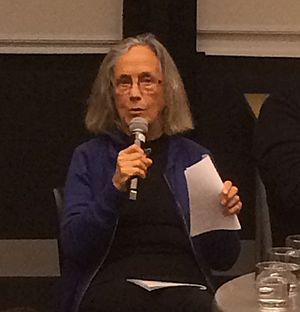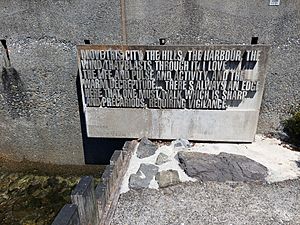Patricia Grace facts for kids
Quick facts for kids
Patricia Grace
DCNZM QSO
|
|
|---|---|

Grace in 2016
|
|
| Born | Patricia Frances Gunson 17 August 1937 Wellington, New Zealand |
| Occupation | Author |
| Genre | Fiction, short stories, children's fiction |
| Spouse |
Kerehi Waiariki Grace
(died 2013) |
| Children | 7, including Kohai Grace |
Patricia Frances Grace (born 17 August 1937) is a famous writer from New Zealand. She writes novels, short stories, and books for children. She is known for being the first Māori woman to publish a collection of short stories.
Her books often explore Māori life and culture. She writes about how Māori people interact with other cultures, like Pākehā (New Zealand European) people. She also uses the Māori language in her stories. One of her most famous novels, Potiki, is about a Māori community protecting their special ancestral land from development.
Patricia Grace is a very important writer in New Zealand. She has won many awards for her work. These include the Kiriyama Prize and the Neustadt International Prize for Literature. She has also received special honours for her contributions to literature.
Contents
Early Life and Her Start in Writing
Patricia Grace was born in Wellington, New Zealand, on 17 August 1937. She belongs to the Ngāti Toa, Ngāti Raukawa, and Te Āti Awa Māori tribes. Her father was Māori, and her mother was European and Irish.
She grew up in a suburb called Melrose. She also spent time with her father's family on their ancestral land at Hongoeka. When she was seven, her father joined the Māori Battalion to fight in the Second World War.
Patricia went to school in Wellington. She later said that she sometimes felt treated differently because she was Māori. As a child, she did not learn to speak Māori. This was because it was mostly spoken at special events like tangihanga (traditional Māori funeral ceremonies). She tried to learn it later as an adult.
She started writing when she was 25 years old. At that time, she was working as a teacher. Her first short story, "The Dream," was published in a magazine in 1966. This led to a publisher asking her to create a collection of her stories.
Her Journey as a Writer
First Books and Full-Time Writing (1975–1990)
Patricia Grace's first book was Waiariki (1975). It was the first collection of short stories published by a Māori woman writer. The book showed many different parts of Māori life and culture.
Her first novel, Mutuwhenua: The Moon Sleeps (1978), was about a Māori woman and a Pākehā man. It explored their relationship and how their different cultures affected them. This book was inspired by her own parents' experiences.
In the early 1980s, Patricia Grace started writing books for children. She wanted to write stories where Māori children could see themselves. One of her children's books, The Kuia and the Spider / Te Kuia me te Pungawerewere (1981), was published in both English and Māori. It was about a spinning contest between an elderly Māori woman and a spider.
In 1985, she received a special writing award. This allowed her to stop teaching and become a full-time writer. She then finished her most successful novel, Potiki (1986). This book is about a Māori community fighting against people who want to develop their ancestral land. The word "potiki" means "youngest child" in Māori. It refers to the main character, Toko, who is a child. Patricia Grace chose not to explain Māori words in the book. She wanted the Māori language to be seen as a normal part of the story.
During the 1980s, she also helped promote Māori arts. She was a founder of groups for Māori women artists and writers.
Later Novels and Recognition (1990–2015)

Patricia Grace's third novel, Cousins, came out in 1992. It tells the story of three cousins throughout their lives. The book explores whakapapa (family history) and family connections. It also touches on difficult parts of New Zealand's past, like Māori children being taken from their families.
Her fourth novel, Baby No-Eyes, was published in 1998. It took her five years to write. The story is told by an unborn child who died in a car accident. It mixes family drama with modern Māori issues.
Her fifth novel, Dogside Story (2001), focused on a small Māori community by the sea. By this time, Patricia Grace was a very well-known writer.
Her sixth novel, Tu (2004), was based on the experiences of the Māori Battalion during the Second World War. Her own father and other family members were part of this Battalion. She found it a "wonderful challenge" to write about men at war. This book was later made into a play in 2013.
In 2006, she released Small Holes in the Silence, a collection of short stories. She also published a children's book, Maraea and the Albatrosses / Ko Maraea Me Nga Toroa (2008). In 2009, she wrote a true story called Ned & Katina, about a Māori soldier and a Cretan woman.
Recent Works and Continued Influence (2015–Present)
Patricia Grace's seventh novel, Chappy, was published in 2015. It was her first novel in over ten years. It is a family story about a Japanese man and a Māori woman. The book explores themes like accepting different cultures, loss, love, and belonging.
In 2015, she also published a children's picture book called Haka. It tells the story of the famous "Ka Mate" haka.
Patricia Grace is still seen as a very important writer in New Zealand. People admire her calm writing style and her focus on Māori customs and stories. In 2016, a sculpture honouring her was put on the Porirua Writers' Walk. She also has a quote on the Wellington Writers Walk.
Her autobiography, From the Centre: a writer's life, was published in May 2021. An autobiography is a book about a person's own life. Reviewers said the book showed her determined and thoughtful nature. In the same year, her novel Cousins (1992) was made into a feature film.
In 2024, a new collection of her short stories was published. It is called Bird Child and Other Stories. This was her first new short story collection in seventeen years. Readers have shown great respect and admiration for her work.
Awards and Honours
Patricia Grace has won many awards throughout her career.
- Her first book, Waiariki (1975), won an award for the best first fiction book.
- Potiki (1986) won the New Zealand Book Award for Fiction in 1987.
- Her children's book The Kuia and the Spider / Te Kuia me te Pungawerewere (1981) won the Children's Picture Book of the Year Award.
- In 1988, she received the Companion of the Queen's Service Order (QSO) for her community service.
- She received an honorary Doctorate of Literature from Victoria University of Wellington in 1989.
- Dogside Story (2001) won the Kiriyama Prize for Fiction in 2001. It was also considered for the Booker Prize.
- Tu (2004) won several awards at the 2005 Montana New Zealand Book Awards.
- In 2005, she received an Icon Award from the Arts Foundation of New Zealand. This award is given to important living artists for their amazing lifetime achievements.
- In 2006, she received a Prime Minister's Award for Literary Achievement. This recognised her big contribution to New Zealand literature.
- In 2007, she was appointed a Distinguished Companion of the New Zealand Order of Merit (DCNZM) for her services to literature.
- In 2008, Patricia Grace was awarded the Neustadt International Prize for Literature. This is a major international literary award.
- In 2016, she received another honorary Doctorate of Letters for her writing about Māori themes. She also won a top award at the Te Waka Toi Awards.
Personal Life
Patricia Grace was married to Kerehi Waiariki Grace, who was also a children's author. They met at teachers' college. They had seven children together. Her husband passed away in 2013. Patricia Grace has said that they shared all the work at home and with their children. Her novel Chappy (2015) was dedicated to him.
Their daughter Kohai is a well-known weaver. Their sons Wiremu and Himonia are filmmakers.
Patricia Grace also does volunteer work. In 2014, she won a legal case against the New Zealand Government. The government had tried to take land at Hongoeka Bay to build a road. The court decided that the land should be protected as a Māori reservation. As of 2021, Patricia Grace was still living in Hongoeka, on her family's ancestral land.
Selected Works
Novels
- Mutuwhenua: The Moon Sleeps (1978)
- Potiki (1986)
- Cousins (1992)
- Baby No-eyes (1998)
- Dogside Story (2001)
- Tu (2004)
- Chappy (2015)
Non-fiction
- Ned and Katina: a true love story (2009), a biography
- From the Centre: a writer's life (2021), her autobiography
Short-story collections
- Waiariki (1975)
- The Dream Sleepers (1980)
- Electric City and Other Stories (1987)
- Selected Stories (1991)
- The Sky People (1994)
- Collected Stories (2001)
- Small Holes in the Silence (2006)
- Bird Child and Other Stories (2024)
Children's books
- The Kuia and the Spider / Te Kuia me te Pungawerewere (1981)
- Watercress Tuna and the Children of Champion Street / Te Tuna Watakirihi me Nga Tamariki o te Tiriti o Toa (1984)
- The Trolley (1993)
- Areta & the Kahawai / Ko Areta me Nga Kahawai (1994)
- Maraea and the Albatrosses / Ko Maraea me Nga Toroa (2008)
- Haka / Whiti te Rā! (2015)
 | Charles R. Drew |
 | Benjamin Banneker |
 | Jane C. Wright |
 | Roger Arliner Young |

